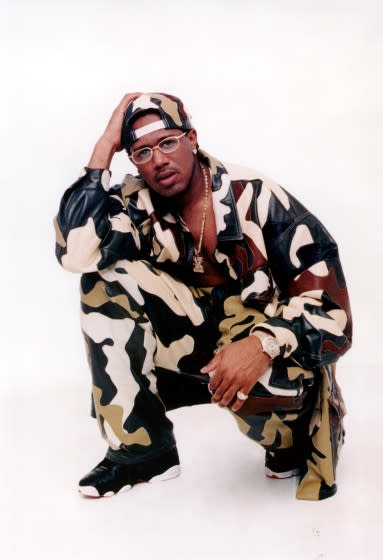In BET's 'No Limit Chronicles,' a Black-owned record label finally gets its due

In 2016, when Solange released her critically acclaimed “A Seat at the Table,” she anchored the album with snippets of conversations she'd had with ’90s rap mogul Master P. In one, titled “For Us By Us,” the No Limit Records founder spoke of turning down one particular big-money deal: “What do you think I’m worth if this white man offers me a million dollars?” In "No Limit Chronicles," the five-part BET docuseries on his New Orleans-based hip-hop label that concludes Wednesday, Master P expounds on this, claiming that the white man was former Interscope Records CEO Jimmy Iovine and that the deal wouldn’t have allowed him to retain ownership of his music or name.
Earlier this year, as companies across various industries pledged to make workplaces more equitable for Black employees, the music industry held Blackout Tuesday to reflect on the harm the record industry has done to Black creatives, and to consider a plan of action for moving forward. But in a feature published last week, Rolling Stone noted that proof of change is “hard to find.” “None of the labels have said publicly that they will rethink the types of record deals they offer young black men and women," wrote Elias Leight. "None of the labels have come forward to say they will write off the unrecouped balances of older black artists that are no longer signed to them.” More than two decades after Master P (born Percy Miller) allegedly told Iovine during a meeting that he was going to go grab lunch and never returned, artists are still fighting for ownership of their work.
In recent years, Master P has talked in several interviews about rebuffing Iovine, proof of his lifelong faith in his own self-worth. But that faith faced some tests. It took No Limit four years before they had their first hit, "I'm Bout It, Bout It," a family affair with Master P, his wife, Sonia C, and his brothers Silkk the Shocker and C-Murder, under the collective name Tru. Iovine, who'd brought gangsta rap into suburban bedrooms, saw that Master P was on to something. Master P, never lacking in self-confidence, thought the same. He Heismaned Iovine, moved his operations from Richmond, Calif., to New Orleans and willed an empire.
No Limit built its success on utilitarian Southern rap: a steady output of hits from Master P, Silkk the Shocker, Mystikal and Mia X, all produced by in-house team Beats by the Pound. CEO Miller paired a minimalist sound with maximalist output and branding: The label issued albums with assembly-line efficiency; all album art featured a proudly garish, uniform look courtesy of Houston-based graphics firm Pen & Pixel; and booming merchandise sales revolved around the signature No Limit tank, a nod to Miller’s grandfather, who served in the military. The No Limit aesthetic was so popular that Master P eventually issued his own talking action figure, adorned with its own mini No Limit chain.
By 1998, Master P was listed as the 10th highest-paid entertainer, and the top-ranked rapper, by Forbes magazine, with $56.5 million in earnings. That year, No Limit Records had record sales totaling $100 million and the brand expanded to include film, sports management and a phone sex operation.
Barry Hefner, president and co-founder of the Atlanta-based label and management firm Since the ’80s, says he has long looked up to Master P. He remembers marveling at the marketing “genius” behind No Limit, from the militant branding to the way the back of every physical CD teased the next album that would be released by the label. “The formula was to build the brand and keep hitting them with products,” he said.
Knowing well the importance of branding, Master P, who executive produced "No Limit Chronicles," glosses over some of the less favorable parts of the label’s story in the series. The final episode never mentions the company’s 2003 bankruptcy. Recounting No Limit’s decline, when artists Mia X, Snoop Dogg and Mystikal left the label, Master P downplays their departures. “The artists didn’t leave No Limit,” he said before contradicting himself. “They went and got other deals with other companies.” Artists who lodged business complaints against Master P, such as the production group Beats by the Pound, weren’t interviewed for the docuseries.
Still, "No Limit Chronicles" offers a vivid portrayal of the decade in which the South emerged as hip-hop’s third coast. Labels such as Atlanta’s LaFace and SoSo Def and Houston’s Rap-A-Lot had already released hit records, but the region was still fighting to be taken seriously on a national scale. In the series, Master P recalls looking at the success of Atlanta stars Outkast and Goodie Mob when deciding to take No Limit Records from California back to New Orleans. Today, the South is hip-hop's cultural and economic engine, led by streaming-dominant artists such as Lil Baby, Da Baby and Megan Thee Stallion. But the foundation for this was laid by executives like Master P, who has since handed the reins of No Limit to his son, Romeo.
When she released her 2016 album, Solange subverted the standard white gaze by suggesting that the "seat at the table" was being offered by Black people. White people weren’t the owners of the space, they were invited guests. "No Limit Chronicles" reminds fans that 20 years before that, Master P created his own brand that centered his identity as a Southern Black man and invited the world to sit for a while.

